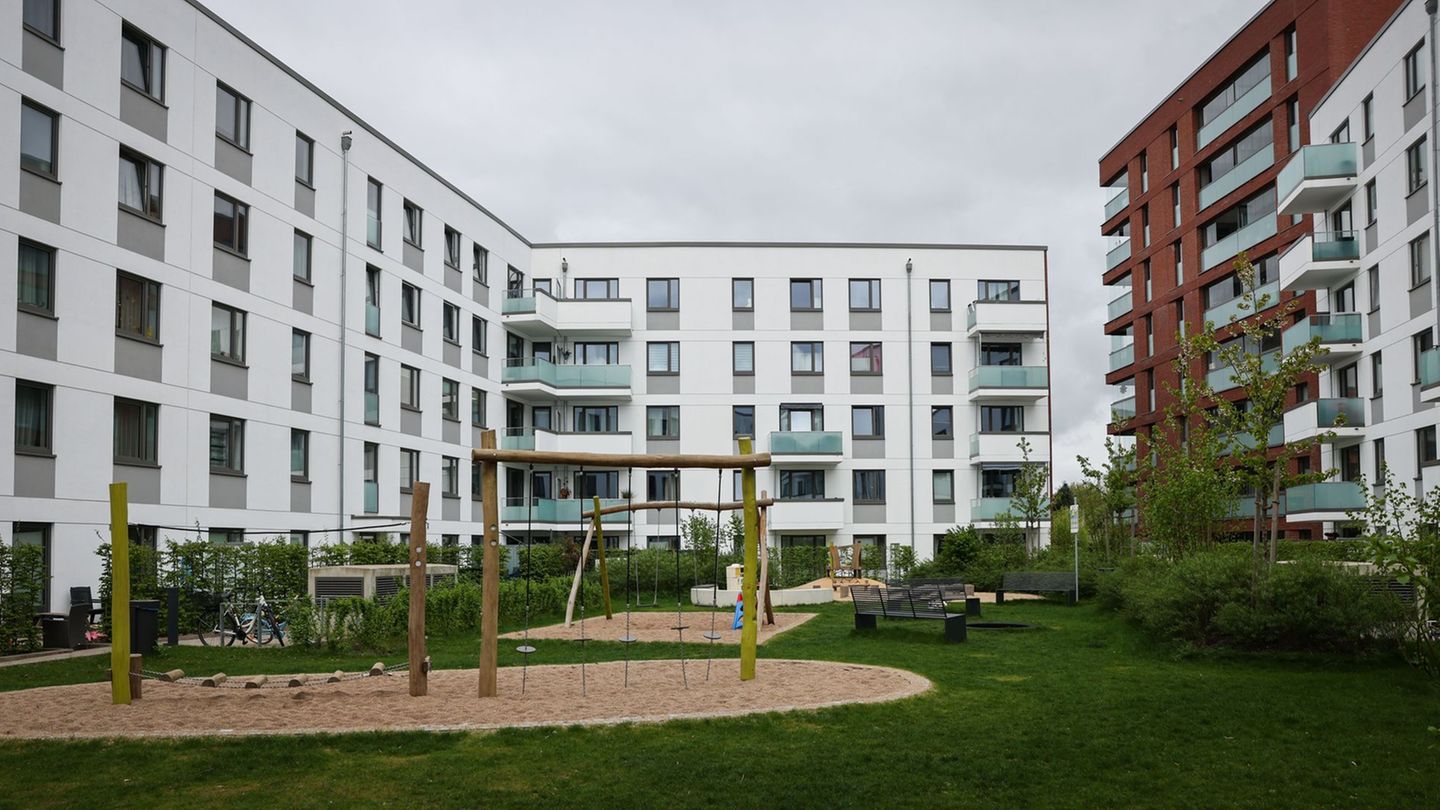Reside
Is the rent control imminent?
Copy the current link
The rent brake will expire in the federal states by the end of 2025 at the latest. After the traffic lights go out, an extension becomes increasingly unlikely.
Over half of the population in Germany lives in rent. According to an evaluation by the Federal Statistical Office, Germany is the number one tenant country in the European Union. Correspondingly – especially in big cities. In order to put a stop to this, politicians introduced the rent cap in 2015. But their future is uncertain after the end of the traffic light coalition. The tenants’ association warns of rising rents.
How does rent control work?
In tight housing markets, the rent cap ensures that the rent when a new rental agreement is concluded can in principle not be more than ten percent above the local comparative rent. It currently runs until the end of 2025. The respective state government decides whether the rent cap applies in certain areas. You must also justify an application.
Why is it running out?
The rent cap law has so far stipulated that the state regulations on this expire on December 31, 2025 at the latest. In seven federal states, the rent control expires even earlier, the first in Berlin on May 31st.
The traffic light coalition originally agreed in its coalition agreement to extend this deadline until 2029. In October, the then responsible Federal Minister of Justice, Marco Buschmann (FDP), presented his draft law – which envisaged an extension until the end of 2028. According to the draft, there should also be higher requirements for justification for repeated use in a specific area. After the end of the traffic light coalition, it is unclear whether there is still a majority in favor of it in the Bundestag.
Will the rent control be extended before the new election?
This is still unclear. According to a spokeswoman for the Federal Ministry of Justice, the draft law is still being voted on within the federal government. But it is unlikely to be introduced into the Bundestag. The SPD’s housing policy spokesman, Bernhard Daldrup, announced that the draft was not extensive enough for his group and that he was still hoping for improvements. The Greens and the Left also see a need for improvement in the rent cap. For the Green Party’s housing policy spokeswoman, Christina-Johanne Schröder, an extension is the highest priority. Caren Lay from the Left said “at least that would be better than nothing.”
However, the votes from the three parties would not be enough to extend the rent cap in the Bundestag. When asked, the FDP, whose minister still worked out the previous draft as part of the federal government, said that they had always spoken out against the rent cap. “The rent brake was and remains a brake on investment,” said their housing policy spokesman Daniel Föst.
The Union also expressed its opposition to an extension of the rent cap. This can hardly be justified in the constitutional court, explained housing policy spokesman Jan-Marco Luczak. “It cannot be extended as often as desired; the guarantee of ownership sets constitutional limits to the regulation of tenancy law.” The AfD’s housing policy spokesman, Marc Bernhard, announced that his group would not agree to an extension. The Sahra Wagenknecht alliance has not yet commented on this when asked.
What are the parties’ further plans for rent control?
While the CDU/CSU, FDP and AfD fundamentally reject the rent cap, the Greens and the Left are already communicating further plans for the future in view of the upcoming election campaign. The new party leadership of the Greens announced that they wanted to close loopholes in a reform of the rent control system. Furnished apartments have not yet been included. There is even talk of a possible rent freeze in particularly tense residential areas.
The left also wants to remove exceptions for modernization and furnishing. In your opinion, the previously permitted 10 percent above the comparable rent for new rentals is too high.
The SPD, on the other hand, is still betting that the law will be passed before the new election. SPD MP Daldrup said one should not wait for the formation of a new federal government. He referred to the states that will have to extend their rent control regulations in the summer. “If social peace in the country is important to the Union, I hope my appeal to the CDU/CSU parliamentary group will be effective: let us pass the law together,” said Daldrup.
What consequences could an end have?
According to the German Tenants’ Association, the expiry of the rent cap threatens to have incalculable consequences for the tense housing markets in many German cities. “Without a rent cap, re-letting rents will skyrocket because there would then no longer be an effective cap,” said Lukas Siebenkotten, President of the German Tenants’ Association. Rents of an average of 17 euros per square meter are then normal.
“Letting this instrument expire without being able to offer sufficient affordable housing at the same time would be extremely unreasonable,” said Siebenkotten. According to Konstantin Kholodilin from the German Institute for Economic Research, if the rent cap expires, it is to be expected that “rental prices will rise a little more”. An expiry of the rent control could also be a positive stimulus for construction.
Kai Warnecke, President of the Haus und Grund owners’ association, said: “We expect that private landlords will continue to base their new rentals on the local comparative rent plus 10 percent.”
What are the arguments for and against rent controls?
Opinions differ about the usefulness of a rent cap. “The rent cap has been in effect for almost a decade. During this time, the situation on the housing market has not improved,” argued Warnecke. The negative consequences of the rent cap for tenants are slowly becoming visible: fewer modernizations and less new construction.
Instead, Warnecke calls for support for people who are heavily burdened by rent. “The welfare state should help these people – instead of reducing rents for the wealthy through rent controls.” Siebenkotten, on the other hand, is certain: “Capping new contract rents in tight housing markets is absolutely the right thing to do.” This is the only way to ensure that rents remain affordable.
The big advantage of the rent control in Germany is that it is relatively mild, said Kholodilin. “You’re only wrong if you think you can outsmart the market.” He doesn’t think the approach is fundamentally correct because, in addition to capping rents, the rent cap results in, among other things, a deterioration in the quality of the apartments and less new construction. The pressure on the housing market is only increasing.
DPA
mkb
Source: Stern
I have been working in the news industry for over 6 years, first as a reporter and now as an editor. I have covered politics extensively, and my work has appeared in major newspapers and online news outlets around the world. In addition to my writing, I also contribute regularly to 24 Hours World.






